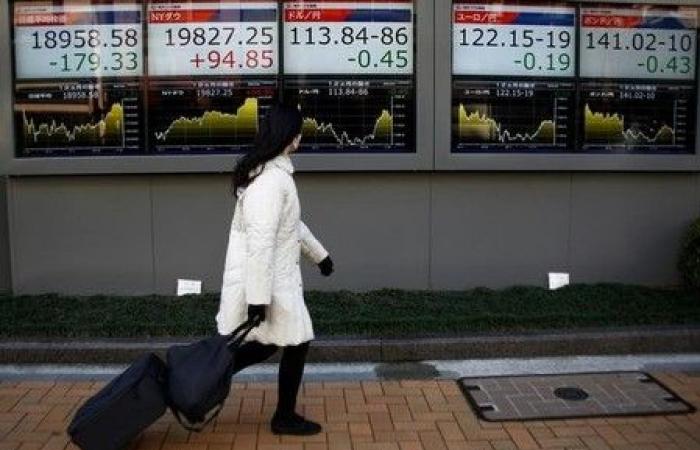Tokyo (awp/afp) – Asian stock markets climbed on Tuesday, driven by a cautious renewed optimism about Donald Trump’s future customs measures and by the surge in semiconductor-related stocks in the wake of Wall Street.
Chips celebrating, Nvidia scrutinized at CES
After soaring on Wall Street on Monday, shares of semiconductor-related companies jumped in Asia as the boss of American chip giant Nvidia, Jensen Huang, announced new products linked to artificial intelligence at the Grand Tech show. CES audience in Las Vegas. The group’s title has just reached a new peak in New York.
Another factor for optimism: Microsoft plans to spend $80 billion over one year to build data centers necessary for the deployment of generative AI models.
On the Tokyo Stock Exchange around 03:40 GMT, Disco Corp (+7.98%), Advantest (+7.05%) and Screen Holdings (+5.98%) were soaring together, while Tokyo Electron, which supplies Nvidia manufacturing equipment, gained more than 10%.
In Taiwan, electronics giant Foxconn (Hon Hai), partner of Nvidia, and sophisticated semiconductor specialist TSMC both jumped more than 3% before limiting their gains.
Cautious optimism about Trump
The European and American stock markets jumped on Monday after information from the Washington Post according to which Donald Trump would consider a more limited increase in American customs tariffs than expected, restricted to certain sectors – which would mitigate the economic impact.
The Republican president-elect, who will take office on January 20, vigorously denied the article, which he called “fake news.”
This did not, however, prevent investors’ appetite for risky assets, and therefore the stock markets, from being significantly strengthened on Tuesday in Asia.
On the Tokyo Stock Exchange around 03:40 GMT, the flagship Nikkei index climbed 2.06% to 40,115.41 points, and the broader Topix index rose 1.04% to 2784.86 points. In Seoul, the Kospi index gained 0.6%.
However, trade should remain volatile: Washington’s rejection of the planned acquisition of US Steel by Nippon Steel (-1.83% in Tokyo) shows the importance of “political issues”, noted Tokai Tokyo experts.
“It should be borne in mind that the shares of groups subject to high risks of increased customs duty rates could continue to fluctuate unstable,” they added.
Dollar sous pression
The dollar fell on Monday after the publication of the Washington Post.
If tariffs are not as high as expected, the euro and yen may not be as negatively affected as feared, and US inflation would not accelerate as much — leading to faster declines Fed rates, making the greenback less profitable.
However, with Mr. Trump’s denial, the American currency tried to recover in Asian trade: around 03:40 GMT, the greenback climbed 0.31% against the Japanese currency, to 158.10 yen per dollar. .
The yen was also supported by statements from the Governor of the Bank of Japan, Kazuo Ueda, who confirmed that the institution remained prepared to continue raising its rates.
Tencent and CATL plunge
The action of Chinese technology giant Tencent fell by 7% at the opening of the Hong Kong Stock Exchange after its inclusion on an American list of “Chinese military companies”.
The Chinese battery manufacturer CATL, also placed on the list of the American Department of Defense, saw its price fall by 5.2%, in a Hong Kong market down by around 1%.
Around 03:40 GMT, Tencent fell by another 6.84% and CATL by 2.75%. At the same time, the Hong Kong Hang Seng index lost 1.97% to 19,299.78 points.
The Shanghai composite index lost 0.32% and that of Shenzhen 0.05%, despite the efforts of the Chinese authorities to send reassuring signals to investors.
China could suffer badly from a tightening of the trade war with the United States.
On the oil market, a barrel of American WTI lost 0.19% to $73.42, and that of Brent from the North Sea lost 0.12% to $76.21.
afp/jh






